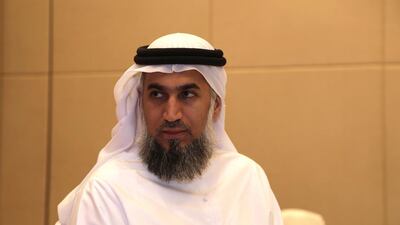DUBAI // The average age of a stroke victim in the UAE is 45 – 20 years younger than the global average – and the number of patients has increased dramatically over the past few years.
Last year about 10,000 people had strokes, compared to the fewer than 8,000 a year reported for 2013 and earlier. And there are only four treatment units in the country, said Dr Suhail Al Rukn, consultant stroke specialist at Rashid Hospital.
“We have four units, which is a good number compared to the region but not as many as we need,” said Dr Al Rukn, also president of the Emirates Neurology Society. “We are working closely with other authorities to build a stroke centre.
“One is the Ministry of Health, as they don’t have a stroke centre. We urge all hospitals to continue to work to develop dedicated stroke units.” He said strokes had become the leading cause of disability in the UAE.
Boehringer Ingelheim, the pharmaceutical firm, on Sunday held its second Stroke Academy in Dubai as part of its Angels initiative to provide doctors with resources and support.
“When you look at the number of hospitals in our region and you compare it with the number of units that can treat stroke you will see a huge gap,” said Karim El Alaoui, the company’s regional managing director.
“The region still lacks insight on the prevalence of strokes.
“Our aim is to have an equip-ped stroke centre in every corner so we don’t lose lives due to the time lead needed to reach to the nearest centre.”
The four stroke units are at Rashid and Saudi German hospitals in Dubai, Cleveland Clinic Abu Dhabi and another in Al Ain. For patients in remote areas such as Hatta, doctors are using telemedicine to treat victims.
Dr Nooshin Bazargani, board member of the World Heart Federation, said two stroke centres in Dubai were not enough.
“We need more stroke units and more rehabilitation centres,” Dr Bazargani said.
The Dubai Health Authority’s Mena Stroke Initiative is working to establish a stroke centre.
A stroke occurs when the blood supply to the brain is interrupted or reduced. In a minute, a victim can lose up to 2 million brain cells. The longer a stroke remains untreated, the greater the chance of brain damage.
Dr Al Rukn said if a patient was treated within 60 minutes of a stroke it would greatly reduce chances of complications.
Symptoms can include sudden numbness or weakness of the face, arms or legs on one side of the body, speech impairment, trouble with eyesight, loss of balance and severe headaches.
Preventive measures include lowering blood pressure and sugar, routine check-ups and heart scans for those over the age of 45.
arizvi2@thenational.ae


